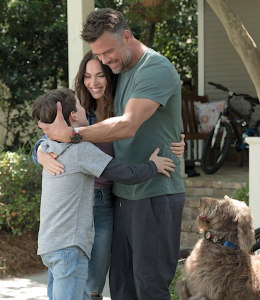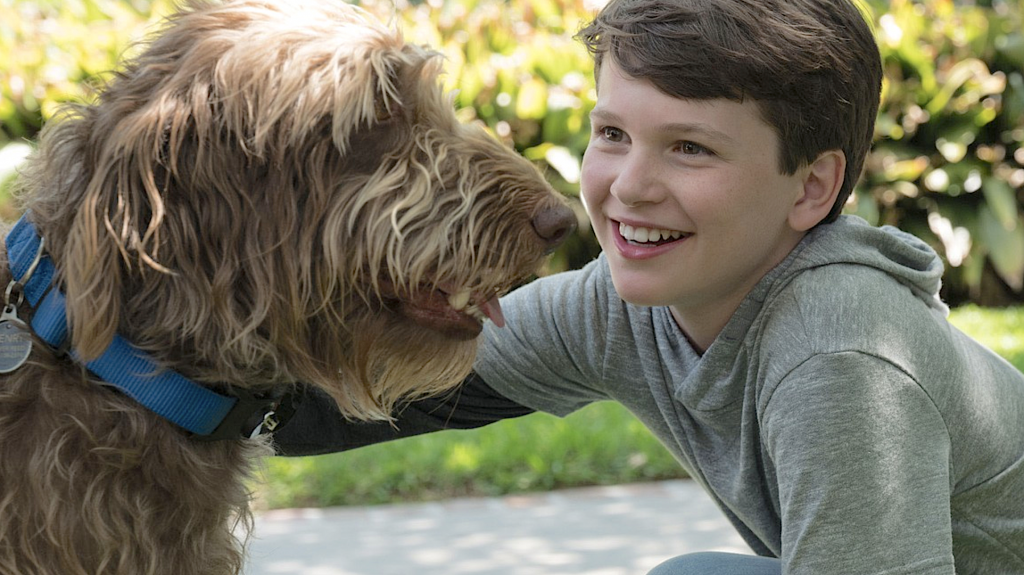“Adults are complicated. But Henry’s simple.”
This line could sum up the recent family flick “Think Like a Dog.” And in a world with such bad news, disagreement, and uncertainty as ours, it indeed can seem like adulthood dumps us into a web of hustle and bustle, cares and concerns.
But this lighthearted adventure, released via Lionsgate June 9, challenges that notion.
Written and directed by Gil Junger (“10 Things I Hate About You,” “Hope & Faith”), “Dog” tells the story of Oliver Reed (Gabriel Bateman), a 12-year-old science whiz, and his beloved dog Henry (voiced by Todd Stashwick). As Henry introduces the audience to his family, we quickly discover that all is not well in the Reed household. Ollie’s parents, Lukas and Ellen (Josh Duhamel and Megan Fox), exchange passive-aggressive comments and dismissive eyerolls, and their hyperfocus on their to-do lists makes them both forget about Ollie’s big science fair presentation.
The marriage seems to be souring day by day, but when Olie’s science fair project helps him hear Henry’s thoughts, the two put their heads together to save their family from falling apart. And they must do it within 24 hours, before Lukas decides on a job offer in another city — and before federal agents trace a communication system breach to Ollie’s invention.
The time crunch gives the movie a quick pace and a simple plot. Ollie and Henry devise their plan fairly early on: get Mom and Dad to dance to their wedding song and remember how much they love each other. While there’s enough subplot and characters to keep it interesting, the film offers neither detours from nor developments to that central course.
It’s a simple strategy, and it works brilliantly.
Such a basic structure might make for a snooze fest in other films, but Junger makes the simplicity of “Dog” not a weak point but its greatest asset. So, what is it about that simplicity that makes “Dog” so satisfying?
For one thing, the main characters are irresistibly endearing. Henry’s witty humor, Ollie’s innocence, and even Lukas and Ellen’s affection for their son can’t help but win over an audience from the start.
For another, the film bakes in just enough silliness to entertain without irritating. A handful of goofball characters appear now and then to throw in some slapstick, but they don’t distract from Ollie and Henry’s mission. And although some off-color jokes might make kids gape and parents cringe, they leave plenty of room for good, clean fun.

But most importantly, the film’s simplicity succeeds because it rests on a couple of unvarnished truths.
The first is that divorce is a tragedy. The film has no qualms about portraying the pain that the prospect of separation inflicts on a child. Divorce is “the worst thing that could ever happen to a family,” Ollie tearfully explains to Henry. As much as his parents try to assure him that their love for him won’t stop, he refuses to settle for less than unity.
Only by acknowledging Lukas and Ellen’s conflict as a problem — and a solvable one at that — can Ollie and Henry’s plan to rekindle their romance have any chance of succeeding. Only then can it drive home the (often muddied) message that marriage and family are objective goods, and that their destruction is objectively sad.
The second truth that “Dog” expresses is likewise simple yet profound: The most important things in life are love and family. What’s more, when those two things are prioritized, everything else falls into place.
At one point, Henry reminds Ollie of when the family lived in an RV for a period of time. Even though they had very few material comforts then, they were happy because their primary focus was one another. The same idea holds for their rescue mission. If they can get Lukas and Ellen to think of each other — even just look at each other — with a little more love, then they’ll remind them of how little their arguments and worries matter. Call it naive, call it simplistic, but in a movie as heartwarming as this one, it’s hard to contradict.
This isn’t to say that the adults’ outlook is entirely wrong; sometimes life does get complicated, and it’s difficult to know what the right course of action is. But like a fairy tale, “Think Like a Dog” cuts through the complexity and highlights basic truths. It reminds parents and kids alike that the moments when we’re happiest and at our best are often the simplest ones. In those moments, we have few attachments, longings, or concerns beyond the gifts we have before us. So simple, so true, yet so easily forgotten.
As Henry puts it, “When humans grow up, they start to focus on the wrong things and forget about what matters.” If it takes a simple, lighthearted movie about a boy and his talking dog to remember what matters in life, then it’s exactly the kind of movie that humans need.
“Think Like a Dog” is available to stream for purchase at lionsgate.com.

